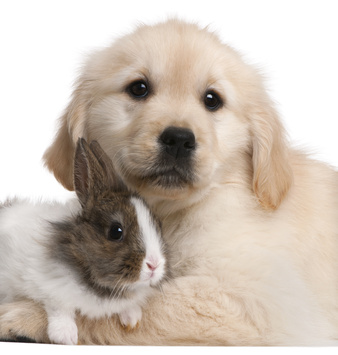
Product Testing For Safety With Our Mineral Makeup & Skincare
We do product testing on every mineral makeup and skincare product we sell on our many human volunteers prior to them being released to market. If it doesn't work on our skin, it won't work on yours and the process of trial and error begins again.
We have determined through such testing, including historical data reports from the FDA and CIR (cosmetic ingredient review) on raw ingredients, our minerals and skincare products to be safe when used in accordance with directions and free of any complications when used correctly.
None of our products are tested on animals nor do we understand this practice, or why anyone would want to torture an animal in the name of the almighty dollar, since in today's modern world of Cosmetics Science we feel animal testing is outdated and unnecessary.
Furthermore, we purchase our raw ingredients from manufacturers and suppliers who also do not perform animal testing from a fixed date going forward since we do not wish to support this practice in any context, now or in the future. Plus, we will not be putting any of our products into China due to their stringent animal testing policy for products being sold at retail to their people.
The Benefits Of CIR When It Comes To Not Promoting Further Animal Testing
A Brief Overview: The CIR program was created 35 years ago by the cosmetics industry with the support of the FDA and the Consumer Federation of America. CIR’s singular mission is to thoroughly review and assesses the safety of ingredients used in cosmetics in an open, unbiased and expert manner, and to publish the results in the open, peer-reviewed scientific literature.
Oversight of the program is provided by a steering committee comprised of 3 industry representatives (the President of the Personal Care Products Council, the Executive VP for Science at the Council, and the Chair of the Council’s CIR Science and Support Committee) and 4 public representatives (Consumer Federation of America, Society of Toxicology, American Academy of Dermatology, and the Chair, CIR Expert Panel).
CIR’s procedures call for an initial review of available published and unpublished scientific data relevant for assessing the safety of a cosmetic ingredient or family of cosmetic ingredients. That review is offered for public comment. A draft report is then considered by the CIR Expert Panel. If additional data is needed, an insufficient data announcement describes the required information and interested parties are given time to provide the data. The Expert Panel then issues a tentative safety assessment for public comment. Comments are evaluated and a final safety assessment is prepared.
Animal Testing Prevention: Recognizing that additional data may later become available, CIR re-reviews every ingredient when the new data become available, but no less than every 15 years. This ensures that CIR’s determinations are current.
This historical data is vital for reducing and eliminating future animal testing because CIR posts its findings on the CIR website, where it also posts draft reports for public review and comments. Publishing CIR’s safety assessments is a core part of the CIR mission. They submit their reports for publication in the peer-reviewed International Journal of Toxicology. Three supplemental issues of the IJT appear each year to ensure wide dissemination of the findings of the CIR Expert Panel, and by doing so, ingredient manufacturers within our industry usually do not have to perform additional animal testing when such data already has been captured in CIR safety assessments. Retesting of ingredients becomes redundant and unnecessary.
H.R. 1385 Safe Cosmetics and Personal Care Products Act of 2013 is also a concern: This proposed bill would not eliminate animal testing and could make it mandatory once again if this legislation should pass. Many in the beauty industry support this bill without understanding the full scope of the negative impact it could have on those trying to completely eliminate animal testing, such as "PETA" and "Leaping Bunny" organizations. These organizations would then be moot since they cannot defy a bill that becomes ratified, essentially "law". Although alternatives are requested within the new proposed bill, it is only designed to minimize animal testing, not eliminate it if the alternative testing does not prove satisfactory to the FDA, then animal testing must be reinstated to verify safety.
Sec. 624 Animal Testing Alternatives
`(a) In General- To minimize the use of animal testing of ingredients and cosmetics, the Secretary shall–
`(1) require, where practicable, alternative testing methods that–
`(A) do not involve the use of an animal to test the chemical substance;
`(B) provide information that is equivalent or superior in scientific quality to the animal testing method; and
`(C) use fewer animals than conventional animal-based tests when nonanimal methods are impracticable, including the use of tests that combine multiple endpoints; and
`(2) encourage, where practicable–
`(A) estimation of toxicological properties of a chemical through the use of testing information for one or more structurally similar chemicals where such estimates provide information of sufficient scientific quality;
`(B) the formation of industry consortia to conduct testing to avoid duplication of tests; and
`(C) funding for research and validation of alternative test methods, in accordance with this subsection.
`(b) List of Alternative Testing Methods- Not later than 1 year after the date of the enactment of this subchapter, and triennially thereafter, the Secretary shall publish a list of the alternative testing methods described in subsection (a).
We Support Safe Cosmetics Always
Many parts of the bill are workable for creating and continuing an environment to provide consumer safety, but if it still means hurting even a single animal in the name of cosmetic safety, then as this bill is written, it should not pass and we do not support it's implementation. Leaping Bunny Press Release on this proposed legislation also weighs in on this conflict of interest and essentially supports what we have stated herein.
Please ask your state legislators to say "NO" completely to all animal testing and to get this Sec. 624 amended, or removed from the proposed bill.
